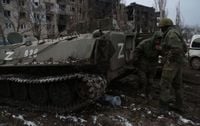As the war in Ukraine grinds into its fourth year, the specter of a new Russian offensive looms large over Europe. On September 3, 2025, Russian President Vladimir Putin delivered a stark warning: if no deal is reached with Ukraine, Moscow will pursue its goals by force, flatly rejecting mounting international calls for a ceasefire. His remarks, made in Beijing following a visit that secured a new gas pipeline agreement with China, underscored the Kremlin’s hardened stance even as Western leaders scramble to shore up Ukraine’s defenses and negotiate security guarantees for Kyiv.
"There is a chance to end the war via negotiations if common sense prevails," Putin stated, according to Reuters. Yet he made it clear that he was prepared to end the conflict by military means if necessary, signaling no willingness to soften Russia’s longstanding demands. Chief among those are Kyiv abandoning any aspirations to join NATO and halting what Moscow describes as discrimination against Russian speakers.
Putin’s comments came as Russian forces intensified attacks along the front, particularly in eastern Ukraine. According to Bloomberg, European leaders are increasingly alarmed by evidence that Russia is preparing a fresh offensive. During a security council meeting in Toulon in late August, German and French officials discussed the significant build-up of Russian troops near Pokrovsk in the Donetsk region. Ukrainian President Volodymyr Zelenskyy revealed that Russia had concentrated about 100,000 soldiers on the front line near Pokrovsk, a city the Kremlin has tried to encircle and capture for over a year.
The strategic importance of Pokrovsk is hard to overstate. Capturing the city would pave the way for Russian advances on Kramatorsk and Sloviansk, bringing Moscow closer to its goal of controlling the entire Donetsk region. Despite these efforts, Russian troops have made only slow progress. Between May and August 2025, Moscow’s forces seized 2,033 square kilometers—about 0.3% of Ukraine’s total territory—according to Bloomberg’s analysis. The summer offensive has proven grueling, yielding little in the way of decisive territorial gains.
Yet the cost for civilians has been staggering. The United Nations reported that July 2025 was the deadliest month for Ukrainian noncombatants since May 2022, with 589 killed and 1,152 injured. Air strikes have intensified, and at least 25 people lost their lives in a single strike on Kyiv on August 28. The human toll is a grim reminder of the war’s relentless brutality.
Against this backdrop, diplomatic efforts to end the conflict have faltered. While Putin noted what he called "sincere efforts by the United States to find a settlement to Europe’s biggest land war since World War Two," sources cited by Bloomberg say negotiations have stalled after a brief surge of activity in early August. Russia, meanwhile, is reportedly preparing for new attacks, and Moscow continues to show no sign of readiness for a truce.
Western leaders are not standing idle. A significant diplomatic gathering—the so-called Coalition of the Willing—will soon convene in Paris to finalize discussions on postwar security guarantees for Ukraine. French President Emmanuel Macron, standing alongside Zelenskyy in Paris, declared that Europe is prepared to provide such guarantees. The Prime Ministers of the Netherlands and Poland are expected to attend in person, while leaders of the UK, Italy, and Germany will join via video link. The meeting is seen as a critical step in clarifying Europe’s commitments and pressing the United States to tighten sanctions against Russia.
Despite these efforts, divisions remain among Ukraine’s allies. According to Bloomberg, the idea of sending foreign troops to Ukraine after hostilities end is controversial and categorically rejected by Russia. U.S. President Donald Trump, for his part, has ruled out deploying American troops but has left the door open to providing air and intelligence support. As U.S. Ambassador to NATO Matthew Whitaker put it, “Ukraine must agree to the security architecture, but Russia must also be comfortable with it.”
NATO Secretary General Mark Rutte emphasized the importance of clarity on security guarantees before any potential meetings between Putin and Zelenskyy can occur. However, with the diplomatic process bogged down and Russian preparations for renewed attacks underway, a breakthrough remains elusive.
For Ukrainian leaders, immediate priorities center on strengthening their own military. German Chancellor Friedrich Merz has described this as the most important security guarantee they can offer. “The issue of deploying foreign troops can only be discussed after a ceasefire,” Merz said. He also stressed that Ukraine’s army must be able to defend itself over the long term, a sentiment echoed by many European officials. “We want to help it do so, both now and in the future.”
Merz did not mince words when it came to Putin’s responsibility for the ongoing bloodshed. “He is possibly the most serious war criminal of our time, which we are now witnessing on a large scale,” Merz declared, according to Bloomberg. He added, “I have no reason to believe Putin on any point.” Merz also argued that Russia’s ability to sustain its military economy must be targeted, stating, “In this context, I’m talking about economic exhaustion, which we must help bring about.”
Even as European leaders debate the contours of future security guarantees, the reality on the ground grows more perilous by the day. Moscow’s renewed military buildup near Pokrovsk, the intensification of air strikes, and the steady drumbeat of casualties point to a conflict that is far from resolution. The planned Paris summit may offer a glimmer of diplomatic hope, but for now, the war’s trajectory seems dictated by the hard calculus of military force and political will.
With both sides entrenched and the stakes only rising, Ukraine’s fate—and the security of Europe—hang in the balance as world leaders weigh their next moves in a war with no easy end in sight.

